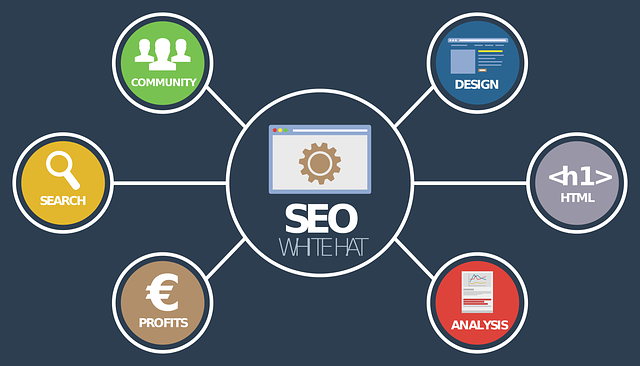SEO Basics are vital for boosting online visibility and attracting organic traffic by understanding search engine operations and implementing key strategies like keyword research, on-page optimization (integrating keywords naturally into web pages), and off-page SEO (acquiring high-quality backlinks). Effective use of these basics improves rankings for relevant keywords, enhancing user engagement. On-page SEO fine-tunes web pages for search engines, while off-page SEO boosts site authority through high-quality backlinks from reputable sources. Technical SEO optimizes site structure for crawlers, and analytics tools measure success. Continuous learning and adaptation to trends are essential in this dynamic field.
“Dive into the captivating world of SEO for beginners! This comprehensive guide unravels the intricacies of search engine optimization, offering a step-by-step journey towards online visibility. From grasping the fundamentals of SEO and the power of keywords to mastering on-page optimization, off-page strategies, and technical nuances, every aspect is meticulously explored.
Learn how to build quality backlinks, ensure your site is crawlable, and leverage analytics tools for success. Uncover common SEO misconceptions and stay ahead in an ever-evolving digital landscape. Embrace the art of SEO basics and watch your online presence flourish.”
Understanding Search Engine Optimization (SEO) Basics

Search Engine Optimization, or SEO, is a fundamental strategy for anyone looking to elevate their online presence and drive organic traffic to their website. At its core, SEO involves understanding how search engines crawl and index websites, and then optimizing content and site structure accordingly. The ultimate goal is to ensure your website ranks highly for relevant keywords when users conduct searches on platforms like Google or Bing.
SEO Basics encompass a range of techniques, including keyword research, where you identify the terms your target audience uses to search for products or services related to your business. On-page optimization involves optimizing individual web pages by incorporating these keywords naturally into content, meta titles, and descriptions while ensuring a seamless user experience. Off-page SEO, on the other hand, focuses on building high-quality backlinks from reputable sources, which signals to search engines that your site is an authoritative source of information.
The Role of Keywords in SEO Strategy

In the realm of SEO basics, understanding the importance of keywords is paramount. Keywords are essentially the building blocks of any successful SEO strategy. They serve as the bridge between what your content offers and who your target audience is. By incorporating relevant keywords into your website’s content—from page titles to headings, meta descriptions, and body text—you enhance search engines’ ability to understand and index your pages accurately.
This process allows search engines to match your content with users’ queries, boosting the likelihood of your website appearing in search results. When crafting a keyword strategy, it’s crucial to research and identify terms that reflect what your audience is searching for. Tools like Google Keyword Planner can aid in this quest by revealing search volume and competition levels for various keywords, enabling you to tailor your content to meet real user needs.
On-Page SEO: Optimizing Your Website Content

Understanding on-page SEO is one of the essential SEO basics for beginners. On-page SEO refers to optimizing individual web pages to rank higher and earn more relevant traffic in search engine results. This involves optimizing key elements within your website’s HTML source code, content, and structure. By ensuring each page has a unique title, meta description, and header tags that accurately reflect its content, you make it easier for search engines to understand what your page is about.
Additionally, on-page SEO requires creating high-quality, relevant, and engaging content that satisfies user intent. This means using keywords naturally throughout your text, including in headings, subheadings, and image alt tags. Well-optimized content not only attracts visitors but also encourages them to stay longer on your site, reducing bounce rates and signaling to search engines that your page is valuable.
Off-Page SEO: Building Quality Backlinks

Off-Page SEO is a crucial component in the realm of SEO basics, focusing on strategies outside your website to boost its authority and visibility. One of the key aspects is building quality backlinks, which are essentially links from other websites pointing back to yours. These backlinks act as votes of confidence in the eyes of search engines. When high-authority sites link to your content, it signals to Google that your site offers valuable information, enhancing its credibility and ranking potential.
Acquiring these backlinks requires a strategic approach. It involves creating engaging, shareable content that naturally draws links from other sites. This can be achieved through guest blogging, where you contribute articles to popular industry blogs, or by offering unique resources like infographics or in-depth research studies. Engaging with influencers and industry leaders and building relationships can also lead to natural backlinks as they share your content with their audiences. Remember, the quality of these links matters more than quantity, ensuring they come from relevant, reputable sources.
Technical SEO: Ensuring Your Site is Crawled and Indexed

When diving into the world of SEO Basics, understanding Technical SEO is a crucial step. This aspect focuses on the behind-the-scenes elements that make your website visible and accessible to search engines. It involves optimizing your site’s structure so search engine crawlers can easily navigate and index its content. These crawlers, or web spiders, traverse the internet by following hyperlinks from one page to another, and ensuring your site is properly structured helps them understand your pages’ relevance and importance.
A well-optimized Technical SEO ensures that your website loads quickly, uses a secure connection (HTTPS), has an XML sitemap, and employs proper use of HTML tags like title tags and meta descriptions. These factors enable search engines to effectively crawl and index your site, which, in turn, enhances its visibility in search results. This is especially important because search engines can’t access or understand content that’s not properly indexed, making it invisible to potential visitors seeking relevant information.
Measuring SEO Success with Analytics Tools

When diving into SEO for beginners, understanding success metrics is paramount. Measuring SEO success isn’t an art but a science, and analytics tools are your lab coat and microscope. Platforms like Google Analytics offer insights into website traffic, user behaviour, and conversion rates – key indicators of SEO effectiveness. By tracking these metrics over time, you can gauge the impact of your SEO strategies, identify what’s working, and pinpoint areas that need improvement.
For SEO basics, focusing on organic search traffic is crucial. This includes understanding where your visitors are coming from (referral sources), how they’re interacting with your site, and ultimately if they’re converting into customers or leads. Analytics tools empower you to make data-driven decisions, ensuring your SEO efforts align with your business goals and lead to tangible results.
Common SEO Misconceptions Debunked

Many newcomers to SEO often stumble upon common misconceptions that can hinder their progress in learning SEO basics. One of the most pervasive myths is that SEO is solely about keywords. While keywords are indeed crucial, SEO involves a multifaceted approach—it’s about understanding user intent and creating content that satisfies both search engines and people’s queries. Just stuffing keywords won’t cut it; instead, focus on delivering value through well-researched, relevant, and high-quality content.
Another common misbelief is that SEO is a one-time task. In reality, SEO is an ongoing process. Search engine algorithms are constantly evolving, and what works today might not work tomorrow. Staying updated with the latest trends and adjustments is vital to maintaining and improving your site’s rankings. Remember, SEO basics include ongoing optimization, regular content updates, and keeping up with industry changes—not just a one-off task.
Continuous Learning in the Evolving World of SEO

The world of SEO is constantly evolving, with new algorithms, trends, and best practices emerging regularly. For beginners, staying up-to-date with SEO basics is crucial to keeping pace with this dynamic landscape. Continuous learning is not just recommended; it’s essential for success in SEO. Following industry blogs, joining online communities, and enrolling in courses can help beginners stay informed about the latest changes.
By dedicating time to ongoing education, SEO practitioners can adapt their strategies accordingly. This ensures that their efforts remain effective as search engine algorithms update. Keeping abreast of developments enables them to implement relevant SEO basics, such as keyword optimization, content creation, and link building, in a way that resonates with current search engine guidelines.
